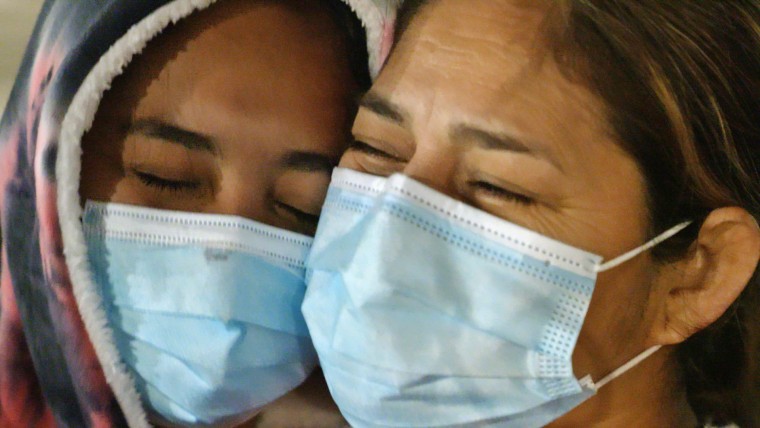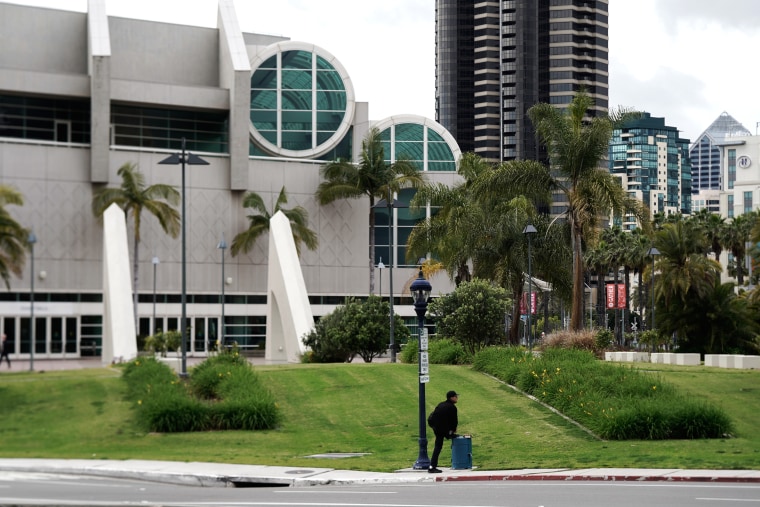SAN DIEGO — Cindy, 17, had not seen her mother in a decade. Last month, she took a chance and journeyed from Honduras until she reached the U.S. border from Mexico for a chance to reunite with her mother, who lives in New York.
Cindy, who is being identified only by her first name for safety reasons, spent three days in a hospital bed on the opposite side of the country, in California, as she battled Covid-19. Although she had spent several weeks in U.S. immigration facilities before she fell ill, her mother did not learn about her daughter's hospitalization until Cindy was able to borrow a phone from a doctor at the hospital.
"There are backlogs and delays in communication that are really unacceptable," said immigration lawyer Kate Goldfinch, who is helping Cindy's mother, Maria Ana, reunite with her daughter. Goldfinch is board president of the nonprofit Vecina, which helps immigrant parents reunite with their children.
Maria Ana, who is being identified only by her first name as precaution to protect her daughter's identity, said she feared she would never see Cindy again after learning she was hospitalized with Covid-19. Following weeks of anguish and uncertainty, Maria Ana spent most of her nights painting the bedroom she has fixed for Cindy, just "waiting for my girl," she said.
But on Wednesday night, Maria Ana flew to San Diego to reunite with her daughter who had just recovered from Covid-19. During the emotional mother and daughter reunion, Cindy shed tears of relief as Maria Ana hugged her and whispered, "no one else is going to hurt you."

Families and immigration advocates are pushing for the government to connect children and teens with their U.S. families in a more timely manner. More than 80 percent of the unaccompanied minors in federal custody have relatives living in the U.S., people the children can be released to, and about 40 percent have parents in the U.S., Goldfinch said.
"So we would think that it would be fairly quick and simple to release a child to their own parent. But because of the chaos of the system, the reunification of these kids with their parents is really frustrating and backlogged," Goldfinch said, "most frustrating, of course, for the actual children and their parents."
Goldfinch said no one at the Department of Health and Human Services, or HHS, or anyone with any of the agency's offices had notified her client that Cindy had been taken to the hospital while she was in its custody.
"I don't know why my daughter has to be suffering this way, because it's not fair. It's something very sad for me," Maria Ana said in Spanish.
"I've already been through a lot," Cindy, who spoke with NBC News with her mother's permission, said. "But I hope it's all worth it."
After having crossed the border, Cindy spent several days in a detention facility in Texas in the custody of Customs and Border Protection, or CBP. On any given night, Cindy said, she would share two mattresses with about eight other girls. She could shower only every five days in one of the eight showers the facility had to serve 700 girls.
"It was really bad," Cindy said.
In response, CBP said in a statement that "addressing the flow of unaccompanied children crossing our southwest border is an important priority." As part of those efforts, the agency continues "to quickly and efficiently transfer unaccompanied minors after they are apprehended to HHS custody, as is required by U.S. law, and as is clearly in the best interest of the children," it said.
The Border Patrol encountered 18,663 unaccompanied children in March, the largest monthly number ever recorded. A complex mix of factors in the U.S. and Central America drove the increase in arrivals to the border, including a series of natural disasters that have added urgency to endemic poverty and violence that have led Central Americans to flee for decades.
Cindy was transferred later to the San Diego Convention Center, where HHS is sheltering hundreds of unaccompanied children. She said the conditions there were "a thousand times better," adding that the staff would periodically check on her and ask her how she was feeling.
In some of those check-ins, Cindy reported experiencing coughs, headaches and fever. A few days later, her symptoms worsened, and personnel at the San Diego facility rushed her to the hospital in an ambulance. Cindy estimates that 100 other girls at the facility tested positive for Covid-19 around that time. As of Monday, 203 children at the San Diego Convention Center had tested positive for the coronavirus, according to an HHS spokesperson.

Cindy was among the 13,350 or so unaccompanied children living in the care and custody of the Office of Refugee Resettlement at HHS. Over the last year, at least 3,715 unaccompanied children have been diagnosed with Covid-19, according to numbers from the Administration for Children and Families at HHS.
Currently, 528 unaccompanied children who have tested positive for Covid-19 remain in medical isolation. As of March 25, none of the minors who had tested positive had needed hospitalization, according to the Office of Refugee Resettlement. Cindy's case is more recent.
The Office of Refugee Resettlement declined to answer specific questions about Cindy's case, citing "a matter of policy, in order to protect the privacy and security of the unaccompanied children in our care." However, a spokesperson for the office said in a statement that its "first priority is to ensure that unaccompanied children are safe, healthy, and unified with family members or other suitable sponsors as quickly and safely as possible."
An arduous process
But the reunification process can be an arduous one for families, Goldfinch said. It all starts by ensuring that the child is officially in U.S. custody.
For almost two weeks, Goldfinch and her team would call a hotline to find out Cindy's whereabouts. On Friday, she submitted the required reunification packet so the agency can release Cindy to her mother. And by Saturday, Cindy had been hospitalized with Covid-19.
"So, by that point, my law firm had had repeated communications with the agency, and we were requesting information from them daily," Goldfinch said. "They should have had us registered in their system as representatives, and they should have had Maria Ana's information, as well."
Maria Ana said she is certain that she is not the only mother who has experienced these struggles trying to find their children within a complex immigration system.
"There are thousands of mothers looking for their children and no one tells them anything and sometimes it’s a lack of communication," Maria Ana said. "We’re scared to talk and lose our children, but I didn’t give up. People would tell me to wait, but no, I’m not waiting. Why would I wait? It’s my daughter."
Nicole Acevedo reported from New York while Simone Boyce, Arlene Aguasvivas, and P.J. Tobia reported from San Diego.
Follow NBC Latino on Facebook, Twitter and Instagram.

